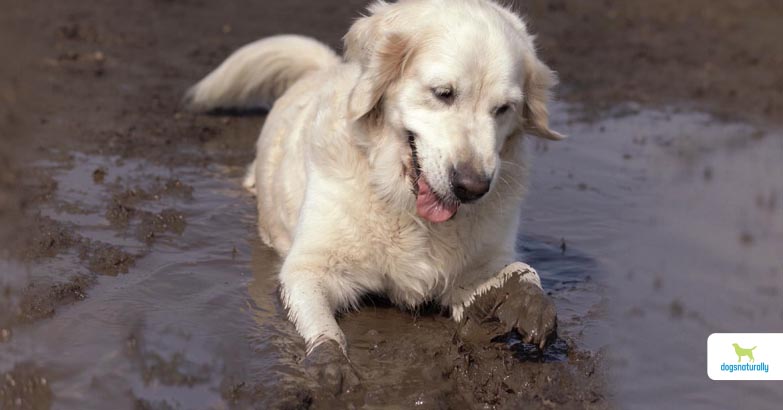The importance of gut health is becoming well known, so many vets recommend probiotics for dogs these days. That means there’s an overwhelming choice of probiotic supplements available.
But there’s one kind of probiotic that’s got some unique abilities you won’t find in other products … and that’s soil-based probiotics. This type of probiotic is made from soil-based organisms. And soil-based probiotics for dogs can help with some specific health problems.
What Are Soil-Based Probiotics?
Soil-based probiotics are made from soil-based organisms (SBOs). These are bacterial organisms naturally found in soil and water. SBOs help support plants by breaking down organic material. And they fight pathogens and provide vitamins to help plants and animals thrive.
These organisms were once a natural part of the food we ate. Vegetables grew in healthy soil and weren’t scrubbed before eating. Meat wasn’t washed before cooking. So we got healthy SBOs in our meals. The bacteria we ate helped support the good bacteria in our guts. And that helped our bodies resist disease.
But modern farming has changed all that. These days, SBOs are destroyed by crop chemicals and herbicides, food processing and pasteurization. The agricultural food industry has become so focused on sanitizing our food that this healthy “dirt” is gone from modern diets. And that’s just as true for your dog.
Dogs love to get dirty … they roll and dig in the mud, drink from filthy puddles … even eat dirt. So maybe their instincts tell them that dirt is good for them. And they’re right! People who garden and kids who play in the dirt are usually healthier than their hand-sanitizing, germ-phobic counterparts. So it’s great to let your dog do some digging and rolling. But there’s another way to get her the same benefits.
The good news is … you can replace these lost organisms by feeding your dog soil-based probiotics. They play a vital role in your dog’s health.
The most common bacteria in soil based probiotics are Bacillus species. Bacillus strains have been shown to support both human and animal microbiomes.
Top Reasons Dogs Need Soil-Based Probiotics
Here are the top 10 reasons to add soil-based probiotics (SBOs) to your dog’s diet.
#1 Support A Healthy Gut
Gut health should be at the top of everyone’s health plan. It’s the same for your dog. SBOs provide powerful support for your dog’s microbiome … the population of beneficial bacteria that live in her gut. Feeding soil-based probiotics helps to build strong bacteria colonies in your dog’s gut. About 90% of your dog’s immune system lives in her gut. So these colonies are the foundation of your dog’s immune system, protecting her from disease.
Beneficial bacteria control “bad” bacteria, viruses, and other invaders. They’re like bouncers in your dog’s gut … stopping the rowdies from joining the party.
#2 Manage SIBO
Soil-based probiotics are ideal to manage conditions like SIBO (small intestinal bacterial overgrowth). With SIBO, bacteria spread to the the small intestine … where they can cause digestive problems for your dog. Other types of probiotics make SIBO worse, because they feed the bacteria in the small intestine, helping them multiply.
SBOs are spore-forming bacteria. They have a seed-like shell that protects them in just about any environment. (Scientists even found Bacillus subtilis could survive in space for up to 6 years!) This protective shell helps SBOs survive their journey until they arrive safely at the colon. So they don’t feed the bacteria in your dog’s small intestine.
This makes soil-based probiotics the one probiotic that can manage SIBO in your dog effectively.
#3 Support Brain Health
The gut is often described as the second brain, because gut health has such an impact on brain health. Studies are proving that link … and It’s the reason people with chronic conditions like irritable bowel syndrome often suffer from depression or anxiety. And now, research confirms Bacillus species can produce norepinephrine and dopamine to support healthy brain function.
So supporting your dog’s gut with soil-based probiotics can help his behavior as well.
#4 Strengthen The Immune System
You now know soil-based probiotics strengthen your dog’s immune system by balancing her microbiome. But Bacillus strains in soil-based probiotics play especially important roles in the immune system. Bacillus strains have some valuable properties, such as …
- Strong antibacterial action
- Potent antioxidant effects to repair cell damage
- Immune cell regulators
Feeding soil-based probiotics also helps the immune system build antibodies. Studies show soil-based probiotics increase production of immunoglobulin A (IgA), which helps repair pathways protect your dog’s gut lining. In the livestock industry, they’ve even found Bacillus can boost pigs’ immune function by improving intestinal mucosa structure and tight junctions. So soil-based probiotics can help prevent immune-damaging leaky gut.
Soil-based probiotics are especially useful if you’ve given your dog any antibiotics or vaccinations. You should also feed SBOs during stressful times like travel or competition.
#5 Fight Superbugs
If your dog gets an infection, your vet will likely prescribe antibiotics. But these meds wipe out all of the bacteria in the body, including the good guys. That upsets the balance of bacteria in the microbiome, weakening your dog’s immune system. So, if your dog’s ever taken antibiotics, she’ll be at risk for other illnesses.
But there’s good news. You can avoid antibiotics in this situations … because research shows Bacillus strains can be effective against diarrhea … even from superbugs like C. difficile. And remember … they also reinforce the good gut bacteria while killing the bad.
#6 Reduce Antibiotic Damage
If you do need to give your dog antibiotics for any reason, soil-based probiotics like Bacillus are the best choice of probiotics to protect her gut. That’s because Bacillus spores shield them from antibiotic damage. So you can give them to your dog at the same time as antibiotics … without worrying the antibiotics and probiotics will interfere with each other.
#7 Manage Yeast
SBOs can help dogs who suffer from yeast overgrowth. Yeast often stems from past vaccines and antibiotics that wiped out all the good bacteria. So if you’ve been struggling with yeast in your dog, feeding SBOs can help restore that balance.
#8 Antioxidant For Cell Repair
Bacillus‘ antioxidant support helps your dog’s body fight cell damage from oxidation. Oxidation is a normal part of your dog’s metabolism … but it needs to be controlled.
Oxidation causes damaged cells in your dog to create free radicals. Free radicals are cells that are missing a molecule … which they try to steal from other cells. That can lead to more damaged cells and even harm your dog’s DNA. Environmental toxins can increase the effects of oxidation as well.
Oxidation leads to premature aging and a weakened immune system. But SBOs can help repair damaged cells. Research has found that certain Bacillus strains can promote intestinal tissue repair and antioxidant activity.
#9 Control Inflammation
Soil-based probiotics are potent tools against inflammation.
Inflammation is a normal response that helps the body heal … but when it becomes chronic, it can cause long-term health problems for your dog. Most disease stems from chronic inflammation. If your dog has chronic inflammation anywhere in her body it puts her at risk for problems like autoimmune disease or cancer. SBOs can help control your dog’s inflammation levels.
Research shows that Bacillus strains can prevent and manage rheumatoid arthritis in rats. Bacillus significantly lowered production of pro-inflammatory immune cells in one study. This means SBOs prevent the body from over-reacting to stress triggers … allowing it to heal without excess inflammation.
Some of the most common chronic inflammatory issues in dogs are:
- Allergies
- Leaky gut
- Inflammatory Bowel Disease
- Auto-immune diseases
Feeding soil-based organisms regularly can help reduce your dog’s inflammation and discomfort.
PRO TIP
Adding prebiotics offers even more support to heal your dog’s gut. Prebiotics feed the probiotics so they can perform at their best. Feeding both ensures your dog gets the maximum benefit from her SBOs.
RELATED: 6 Natural Prebiotics For Dogs: Why Probiotics Aren’t Enough!
#10 Help Fight Cancer
Soil-based probiotics’ immune-boosting and anti-inflammatory actions help protect your dog from cancer. But they can combat cancer cells in other ways too.
Researchers have found anti-cancer effects in many Bacillus strains. One study showed novel Bacillus strains inhibited ovarian and colorectal cancer cells … suggesting Bacillus bacteria are promising anticancer agents against several cancer types.
Bacillus probiotics secrete a surfactin-like compound. Surfactin is a lipopeptide with anti-cancer activity. Bacillus subtilis can also inhibit the growth of human breast cancer cells. Soil-based probiotics have also been shown to improve the benefits of other nutraceuticals given at the same time. That means your dog will get the most out of all of her cancer supplements.
Buy Soil-Based Probiotics For Your Dog
It’s becoming easier to find soil-based probiotics for dogs in retail stores and online. Just make sure you review the ingredients in the product before you buy it. You’ll want to look for organically sourced ingredients with no added fillers.
And remember the power of prebiotics, which feed the probiotics to help them thrive. In fact, one study found prebiotics given with Bacillus coagulans helped reduce inflammation in inflammatory bowel diseases. So look for a product that includes prebiotics in the mix.
RELATED: Learn which probiotics work best for dogs …
Soil-Based Probiotics Dose For Dogs
If your dog’s probiotic is soil-based, then 1 or 2 billion CFU (colony forming units) should be plenty. Your dog shouldn’t need more than this.
Soil-based probiotics don’t need as many CFU in soil-based probiotics as other probiotics like Lactobacillus. This is because of the spore-forming ability of Bacillus species that allows them to travel to your dog’s colon, unharmed by the acidic environment. On the other hand, other probiotic species are extremely fragile and few make it through the digestive tract intact.
Giving your dog soil-based organisms can be a powerful ally in helping her fight disease. And don’t forget to let her play in the dirt as well … that way she’ll get some truly natural SBOs.
References
Galland L. The gut microbiome and the brain. J Med Food. 2014;17(12):1261-1272.
Gutzeit C, Magri G, Cerutti A. Intestinal IgA production and its role in host-microbe interaction. Immunol Rev. 2014;260(1):76-85.
Abhari K et al. The effects of orally administered Bacillus coagulans and inulin on prevention and progression of rheumatoid arthritis in rats. Food Nutr Res. 2016 Jul 15;60:30876.
Stéphanie Dudonné et al. Modulatory effects of a cranberry extract co-supplementation with Bacillus subtilis CU1 probiotic on phenolic compounds bioavailability and gut microbiota composition in high-fat diet-fed mice.
PharmaNutrition, Volume 3, Issue 3, 2015.
Abhari Kh et al.. The effects of probiotic, prebiotic and synbiotic diets containing Bacillus coagulans and inulin on rat intestinal microbiota. Iran J Vet Res. 2015 Summer;16(3):267-73.
Zhao MF et al. Novel Bacillus strains from the human gut exert anticancer effects on a broad range of malignancy types. Invest New Drugs. 2020 Oct;38(5):1373-1382.
Wu YS et al. Anticancer Activities of Surfactin and Potential Application of Nanotechnology Assisted Surfactin Delivery. Front Pharmacol. 2017 Oct 26;8:761.
Jin Hwan Lee et al. The production of surfactin during the fermentation of cheonggukjang by potential probiotic Bacillus subtilis CSY191 and the resultant growth suppression of MCF-7 human breast cancer cells. Food Chemistry, Volume 131, Issue 4, 2012.
Plaza-Díaz J et al. Evidence of the Anti-Inflammatory Effects of Probiotics and Synbiotics in Intestinal Chronic Diseases. Nutrients. 2017;9(6):555. Published 2017 May 28. doi:10.3390/nu9060555
Shinde T et al. Synbiotic supplementation with prebiotic green banana resistant starch and probiotic Bacillus coagulans spores ameliorates gut inflammation in mouse model of inflammatory bowel diseases. Eur J Nutr. 2020 Dec;59(8):3669-3689.











